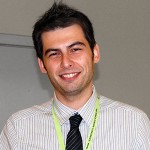 Harris Lygidakis (twitter, website) is coming to HealthCamp Boston.
Harris Lygidakis (twitter, website) is coming to HealthCamp Boston.
Hi, Harris! Please tell us a little about your day job
I am a General Practitioner / Family Physician (GP/FP) and work as a locum doctor in severalPrimary Care practices in Bologna, Italy. Besides my clinical work, I have been involved indifferent research projects.
What are you passionate about?
What I am really passionate about is technology and its phenomenal ways of integrating it in healthcare, achieving better and equal health for everybody. In particular, I am really excited about mHealth, as well as the new possibilities of patient empowerment that are being madepossible thanks to technology and the Internet. It is fascinating how the constant flow of information from patients, healthcare professionals, sensors and devices is determining a radical change in the way we are delivering healthcare. As General Practice / Family Medicine (GP/FM)is perhaps the clinical specialization most affected by social changes, I feel as the middleman between people and medicine, and this gives me a unique overview of the transformation that technology is triggering.
What are you doing to “hack” health care?
Although there are plenty of groups and associations that conduct research in Primary Care in my geographical area, the lack of GP/FM University Departments has made large-scale and well-organized research truly challenging. Since college, I have been working in different research projects, the majority of which has been carried out by smaller independent teams of GPs/FPs. The insight into the difficulties that these teams must overcome has been a lesson of great educational value for me.
Moreover, it is really intriguing how diverse the European context is. As a matter of fact, Primary Care could be compared to the Tower of Babel, made of different healthcare systems, plenty oforganizational models and a variety of individual, community and administrative issues. In this context, GPs/FPs are the common denominator and many of them would like to contribute in research and provide their data from their catchment areas.
Research is not only about white, relatively healthy males from urban cities. In a varied context, we have the opportunity to explore the different conditions and needs of the populations of asmall isolated village in Romania and a rural area in Norway and compared them with those ofbig urban centers such as London and Madrid.
The idea to build a platform for collaborative research was born out of this experience. I have had the opportunity to work with two engineers, Silvio Cambiaso and Nicola Masella, to develop such a platform with the objective to enable teams of researchers and clinicians, as well as institutes and associations, to establish collaborative projects. Our team would like to tackle other issues of the research process and encourage more researchers to engage and participate actively. Perhaps even research can be more social and a crowdsource model may be applied, while maintaining itsacknowledged and professional profile.
Why are you attending HealthCamp Boston?
It’s actually my very first time in a HealthCamp. I have found out about its very interesting program thanks to Twitter and, as I am attending the Medicine 2.0 Congress, I instantly decided to participate in the HealthCamp as well. We are living a revolution in healthcare, so I am very excited to be with people who breathe the same air and I am looking forward to listening to their perspectives, experiences and insights.
If you were to lead a session, what would it be about?
I would be interested in exploring ways to improve the research process and collaboration especially in primary care settings. Moreover, I would be keen in exploring mHealth applications for sectors such as alcohol and smoking interventions.
What kinds of people do you want to meet at HealthCamp?
This must be a brilliant opportunity to meet all types of people; from Healthcare professionalsand key opinion leaders to policy makers and patients.
Liked this post? Follow this blog to get more.


